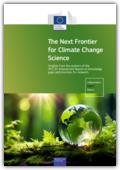Why knowledge about climate mitigation pathways matters
With the European Green Deal and the Climate Law, the EU is firmly committed to becoming climate neutral by 2050. This is necessary to avoid dangerous consequences of climate change by limiting global warming to well below 2°C, ideally to 1.5°C, as agreed in the Paris Agreement.
Scientific evidence is clear: immediate and drastic emissions reductions across all sectors are needed to keep these goals within reach and this decade will be decisive.
Science, which first brought global warming to worldwide attention, will continue to play a central role in defining evidence-based, economically effective and socially just pathways aligned with the global temperature targets. Crucially, evidence from the research community is needed to drive ambition, mobilise action, guide policy responses, and clarify the roles of different actors: from governments, through businesses, to local communities.
What role does EU research and innovation play?
EU-funded projects are developing important knowledge, models and tools to support the design of climate policies that will transform the EU into a fair and prosperous society, with a modern, resource-efficient and competitive economy as envisioned in the European Green Deal.
The results of this research provide valuable insights on how to steer the EU towards climate neutrality by studying the complex interplay between human development, societal choices, and the natural world.
They help policymakers, administrations, businesses and other actors to assess feasibility, costs, risks, trade-offs and co-benefits of their strategies, investments and other important decisions, often building on the insights delivered by Integrated Assessment Models (IAMs).
The dissemination of these results is an essential tool to achieve public support for the necessary societal transformation in the context of climate action.
The projects in this area address many critical components of the socio-ecological transition, such as
- methods for reducing emissions, enhancing sinks, and removing greenhouse gases from the atmosphere
- mitigation options in specific sectors such as energy, industry, agriculture, or transport
- technical, economic, and social feasibility of mitigation options
- the role of consumption and behavioural change, innovation, technology, and finance
- synergies and trade-offs with climate adaptation measures, biodiversity and sustainable development
- climate justice, equity and distributional consequences of climate policies
EU projects
Projects currently supported by Horizon Europe under Destination 1 “Climate sciences and responses for the transformation towards climate neutrality” of Cluster 5 (Climate, Energy and Mobility).
2024 call
2023 call
2022 call
2021 call
For examples of older projects funded under earlier work programmes please refer to the brochure below.
Science for climate action: EU research contribution to IPCC working group III on mitigation
Background
The transition to climate neutrality is an immense challenge and calls for a deep transformation across all key sectors of the economy. This also means fundamentally restructuring the way energy, land water and other resources are used.
In the energy sector, the transition will involve a substantial reduction in fossil fuel use, widespread electrification, improved energy efficiency, and use of alternative fuels (such as low carbon hydrogen).
Reducing emissions in industry will involve using materials more efficiently, reusing and recycling products and minimising waste. For basic materials, including steel, cement and chemicals, new production processes, and, where necessary, carbon capture and storage, are needed.
Agriculture and the land-use sector will also need to reduce their greenhouse gas emissions and expand carbon sinks, while delivering benefits for biodiversity and increased climate resilience.
Changing people's behaviour towards more sustainable habits will also be paramount. The IPCC estimates that demand side changes can result in a 40-70% reduction in greenhouse gas emissions by 2050.
The transition will be costly and must be financed up-front, but in the long run maintaining the business as usual is not an option. The benefits from lower temperatures, avoided extreme events, better air-quality and thriving biodiversity will by far outweigh the costs.
The recent developments bring important lessons - the COVID-19 pandemic has demonstrated that rapid emissions reductions and deep lifestyle changes are feasible, while the war in Ukraine is a case in point why we must break our dependence on fossil fuels.

